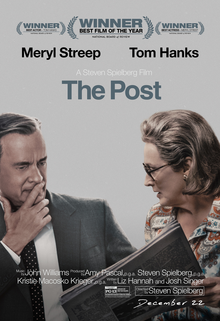The Post, directed by Steven Spielberg, gives an inside look into the controversy of the releasing of the Pentagon Papers in 1971, during the Vietnam War. During the war, a study was written exposing government secrets that said that the Nixon, Johnson, and Kennedy administrations all lied to the public about the progress of the war, when they knew the U.S. could not win.
In the film, The New York Times gets hold of these papers, and starts to publish, but immediately gets sent to court by the Nixon administration. The Washington Post, at the time a struggling local paper, found out what happened and wanted a piece of the action. The motivated editor-in-chief of The Post, Ben Bradlee, played by Tom Hanks, finds a way to get possession of all the papers. This puts the publisher, Katherine Graham, played by Meryl Streep, in a difficult position.
The Washington Post originally belonged to Graham’s father, when he died it was passed down to Graham’s husband. After her husband’s death the company fell into her hands. Being the country’s first female publisher, Graham had a lot of weight on her shoulders.
During the time period, women did not have leading roles in many jobs. Graham was put to a test to show that women can make history too. She has to go against her coworkers telling her there are too many risks to printing the papers. More importantly, she ran The Washington Post on her own.
The Washington Post staff all know the risk of publishing the Pentagon Papers. Even though they have the right of free speech and press, the Nixon administration will still go after them stating that it jeopardizes the safety and defense of the country.
Graham decides to still publish the papers knowing the risks. Already knowing what was coming, the Nixon administration calls The Post and warns them to stop publishing the stories, but they refuse. Soon, The Washington Post and The New York Times become an unlikely team, knowing they are rival newspapers, and both go to the Supreme Court against the Nixon administration to decide whether or not the companies can reveal to the world these government’s schemes.
This movie gives an in-depth example of what the First Amendment is all about. Challenging the press just to protect the welfare of the White House’s reputation instead of the American people questions the First Amendment all together. This amendment is for the people, so if something is hidden from the public, especially on the topic of the people’s safety, then what is the point of it at all?
This movie is interesting in learning about how the government handles problems like these. It shows how the U.S. can try to get away with anything to help them look like the most powerful nation in the world. Even if that means doing whatever it takes to make sure truths don’t come out to the public, even though they have the right to know.
The acting by Streep and Hanks is phenomenal, as proven by the abundance of awards they are nominated for, including Academy Award for Best Actress, Golden Globe awards for both Best Actor and Best Actress and Critics’ Choice Movie Award for Best Acting Ensemble.
The Post has also been nominated for an Academy Award for Best Picture and will go against Get Out, Lady Bird, The Shape of Water, Call Me By Your Name, Phantom Thread, Dunkirk and Darkest Hour.
Sarah Levine
Staff Writer














